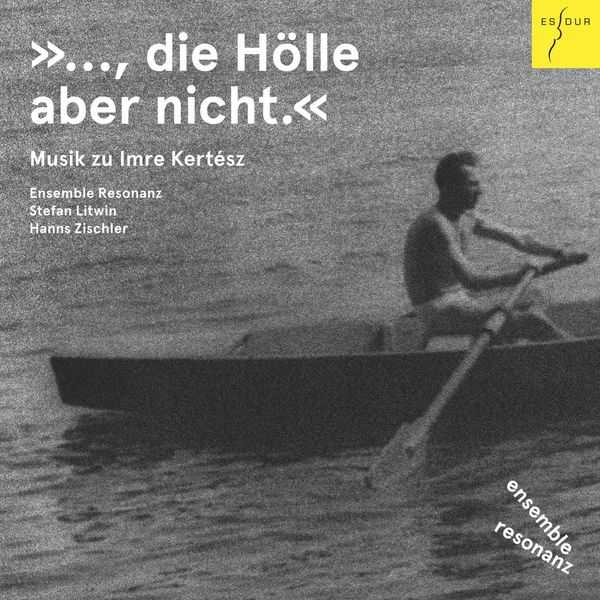

Composer: Imre Kertész, Gideon Klein, Stefan Litwin, Anton Webern, Bernd Alois Zimmermann
Performer: Stefan Litwin, Hanns Zischler, Ensemble Resonanz
Format: FLAC (tracks)
Label: Es-Dur
Catalogue: ES2055
Release: 2015
Size: 257 MB
Recovery: +3%
Scan: cover
Kertész: Gályanapló (Galley Boat-Log)
01. Ich komme mit diesem thema – So höre ich – Zu spät
02. …, Die Hölle aber nicht
03. 12 Buchstaben
04. 12 Ton-technik
Webern: Variations, Op. 27
05. I. Sehr mässig
06. II. Sehr schnell
07. III. Ruhig fliessend
Kertész: Gályanapló (Galley Boat-Log)
08. Schicksalslosigkeit, ein stolzes buch
09. Landkarten
Klein: String Trio (1944)
10. I. Allegro
11. II. Lento
12. III. Molto vivace
Kertész: Gályanapló (Galley Boat-Log)
13. Atonaler roman
14. Gott, ein humorist
Zimmermann: Concerto for Orchestra
15. I. Introduction. Mässig bestimmt
16. II. Aria. Langsam mit ausdruck
17. III. Finale. Mässig schnell
Imre Kertesz, born in Budapest in 1929 and winner of the Nobel Prize for Literature in 2002, is one of the last remaining survivors of Auschwitz and Buchenwald. This recording reflects central aspects of his work in a collage of words and music.
Threaded through the album are excerpts from Kertesz’s 1993 work ‘Galley Boat Log’ read by the distinguished German actor Hanns Zischler while the music consists of pieces by composer/pianist Stefan Litwin, Anton Webern, Gideon Klein and Bernd Alois Zimmermann, performed by Litwin and the Ensemble Resonanz. The musical contributions are set in context and commented on by Kertesz’s words.
Stefan Litwin’s melodrama ‘»…, die Holle aber nicht.«’ (but not Hell) for speaker, piano and string quartet is based on a key scene in Imre Kertesz’s first novel ‘Fatelessness’ and picks up the problematic aspect of dodecaphony, as already critiqued by Theodore W. Adorno in the Philosophy of New Music, and makes this musically tangible.
Webern’s Variations for piano, op 27, composed in 1935, was a model of dodecaphony later taken to the extreme in the high point of serialism after the Second World War. Finally, in the String Trios of Bernd Alois Zimmermann and Gideon Klein, there is a contrast of two composers, whose fate in World War II could not have been more different: one was conscripted into the German Army and survived, the other murdered in a concentration camp. Hamburg’s Ensemble Resonanz represent a new generation of musicians, bridging the gap between tradition and the present. Instead of working with a fixed conductor, the democraticallyorganised musicians collaborate with outstanding instrumentalists such as Jean-Guihen Queyras and Tabea Zimmermann as artists-in-residence. In October 2014 the Ensemble opened the “resonanzraum” in a bunker in Hamburg – a new urban space for classical music with a club atmosphere. For ES-Dur they have previously recorded CPE Bach’s 6 Hamburg Symphonies (ES2053).